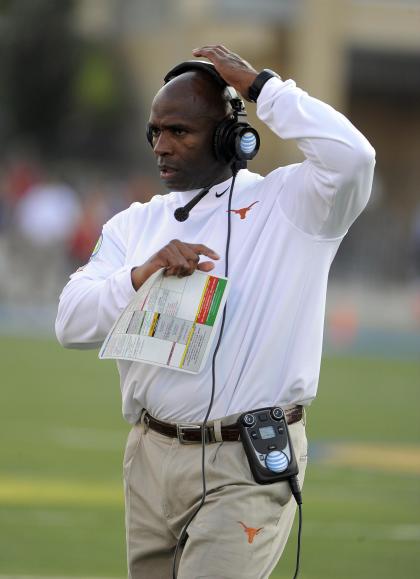NFL gets advice on personal conduct from Texas' Charlie Strong; 'He's taking a stand on the front lines'
DALLAS – The NFL has reached out to several leaders in response to its current conduct crisis, from former players to a former sex crimes prosecutor to domestic violence experts. On Sunday, a more unlikely voice found an audience with commissioner Roger Goodell.
University of Texas head coach Charlie Strong.
Goodell and NFL vice president Troy Vincent met with Strong in Austin on Sunday to share ideas and seek input on discipline issues, but the appreciation for the coach's leadership has built for a while.

"He's setting a precedent," Vincent told Yahoo Sports. "He's taking a stand on the front lines."
League executives have been impressed with Strong's hard line on player conduct. He has ramped up drug testing considerably since taking over the Texas job from Mack Brown – 188 tests in only eight months – and he has dismissed nine players from the Longhorns squad for a variety of reasons. The commissioner was impressed enough to include an in-person visit after a morning meeting with former NFL players in Austin.
Of particular interest: Strong's dismissal of players involved in an alleged sexual assault. Kendall Sanders and Montrel Meander were both kicked off the Longhorns squad after being charged with raping a co-ed over the summer. Strong didn't wait for the legal process to conclude; he took action on his own.
"If I'm a parent," Vincent said, "and I'm looking to send my son or daughter – especially my daughter – to the University of Texas, that coach is saying this is important."
One of the many problems facing the league is that by the time players arrive in the NFL, it may be too late to significantly alter behavior they've learned over time. Disrespect of others is often either ignored or enabled by coddling coaches at lower levels, and a huge pro paycheck can dull the desire to change course.
Strong, like all college coaches, arrives in a player's sphere of influence during the high school years. So part of what the NFL is doing by meeting with him is seeking ways to extend a message to younger athletes.
"What Coach Strong is doing," Vincent said, "Is creating a deterrent. You want to play Texas football, you can't get involved in this."
Strong has listed five core values for his players – the same ones he plastered on a wall at Louisville – "Honesty," "Treat Women With Respect," "No Drugs, "No Stealing, "No Guns." They seem obvious, almost rudimentary, but it's become clear that a lot of athletes at all levels aren't getting the point.
And while Texas has struggled on the field under Strong this season, the message is that there is something more important than winning. That is also something the NFL needs to communicate, even though there is far more money and pressure to win at the professional level.
"We can't compromise," said Vincent, "and sometimes that means getting rid of the best player."
Strong has advantages that other coaches don't: He's new on the job, meaning he has a honeymoon period; he has tons of recruiting talent all around him in Texas; and he has perhaps more in the way of money and resources than any other head coach in the country. He can afford to make this kind of statement.
Still, the NFL has noticed.
"We believe this is a model that should be emulated across the country in both amateur and professional football," Vincent said.
The morning meeting with former players included similar themes of accountability. Present at that conference were Ty Detmer, Jeff Campbell, Dan Neil, Robert Jones, Doug English, Jeff Blake, Patrick Jeffers, William Graham, Jerry Sisemore and Roosevelt Leaks.
Vincent said former players have conveyed a consistent message in meetings so far: "What are your values? Don't compromise them. Set the standard."
